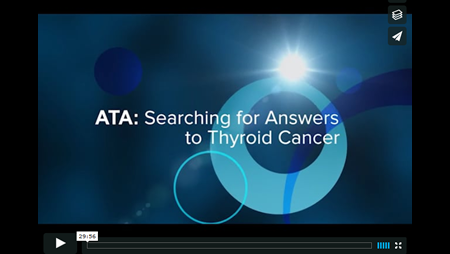Clinical Thyroidology for the Public summarizes selected research studies discussed in the previous month’s issue of Clinical Thyroidology, an official publication of the American Thyroid Association. Editor-in-chief, Alan Farwell, MD, FACE
Available in pdf format for saving and printing and Web page format for viewing online
PDF Format for Saving and Printing
Clinical Thyroidology for the Public Volume 13 Issue 10 (PDF file, 7.5 MB)
TABLE OF CONTENTS – Web Format
COVID-19 AND THYROID DISEASE
COVID-19 infection and thyroid function
COVID-19 infection can range from a very mild or asymptomatic presentation to critical illness and death. Along with multiple organ systems that may be affected by COVID-19 is the thyroid gland. These investigators sought to characterize thyroid function in patients hospitalized with COVID-19 infection.
Lania A et al on behalf of Humanitas COVID-19 Task Force. Thyrotoxicosis in patients with COIVD-19: the THYRCOV study. Eur J Endocrinol. 2020. doi: 10.1530/EJE-20-0335. PMID: 32698147
Muller et al report the association of subacute thyroiditis and COVID-19. The aim of this study was to evaluate the frequency subacute thyroiditis in COVID-19 patients as compared to non-COVID patients admitted to the intensive care unit in Italy.
(PDF File for saving and printing, 1.2 MB)
HYPERTHYROIDISM
Substituting potassium iodide for methimazole in first-trimester pregnant women with Graves’ disease may unpredictably worsen hyperthyroidism
Methimazole is the main treatment option for Graves’ disease during pregnancy. Potassium iodide (KI) has occasionally been used to control hyperthyroidism and may have less side effects on the baby but may make the hyperthyroidism worse. This study aimed to identify predictors of both clinical improvement and worsening hyperthyroidism following the switch from methimazole to KI treatment in hyperthyroid pregnant women.
Yoshihara A et al 2020 The characteristics of patients with Graves’ disease whose thyroid hormone level increases after substituting potassium iodide for methimazole in the first trimester of pregnancy. Thyroid. Epub 2020 Jan 13. PMID: 31928169.
(PDF File for saving and printing, 744 KB)
HYPOTHYROIDISM
Thyroid hormone use doubled in the United States from 1997 to 2016
Thyroid hormone is the most frequently prescribed medication in the United States, and the proportion of adults who report taking thyroid hormone has increased in recent years. The authors of this study sought to understand the proportion of adult individuals using thyroid hormone by age, sex, race/ethnicity from 1996 though 2016. They also aimed to study the costs associated with all thyroid hormone prescriptions during that time.
Johansen ME, Marcinek JP, Doo Young Yun J 2020 Thyroid hormone use in the United States, 1997–2016. J Am Board Fam Med 33:284–288. PMID: 32179
(PDF File for saving and printing, 736 KB)
THYROID AND PREGNANCY
A high proportion of women with history of miscarriage or infertility may have mild hypothyroidism or positive thyroid antibody status
Currently, the American Thyroid Association recommends checking TSH levels in high-risk women with a history of miscarriage or infertility. However, testing and treatment for subclinical hypothyroidism in pregnancy is still debated because clinical trials have not shown a clear benefit. This study was done to determine how frequent subclinical hypothyroidism or a positive TPOAb level is seen among high-risk women with a history of miscarriage or infertility.
Dhillon-Smith RK et al 2020 The prevalence of thyroid dysfunction and autoimmunity in women with history of miscarriage or subfertility. J Clin Endocrinol Metab 105:dgaa302. PMID: 32593174.
(PDF File for saving and printing, 751 KB)
HYPOTHYROIDISM
Effects of increasing levothyroxine doses on mood in older patients with hypothyroidism
Depression is more common in older adults in general and they are more prone to develop depression as the result of hypothyroidism. Prior studies have not shown a beneficial effect on mood after starting levothyroxine in depressed older individuals with subclinical hypothyroidism. The current study examined the effect of increasing the levothyroxine dose in older hypothyroid patients with depressive symptoms.
Moon JH et al 2020 Effect of increased levothyroxine dose on depressive mood in older adults undergoing thyroid hormone replacement therapy. Clin Endocrinol. Epub 2020 Apr 13. PMID: 32282957.
(PDF File for saving and printing, 834 KB)
THYROID CANCER
Patients with papillary microcarcinoma under active surveillance are proceeding to have surgery less frequently.
Active surveillance in patients with papillary microcarcinoma involves frequent neck ultrasounds to make sure the cancer is stable. Over time, patients under active surveillance eventually undergo surgery for a variety of reasons. In this study, the authors examined the trends and reasons for surgery after the initiation of active surveillance.
Sasaki T et al. 2020 Marked decrease over time in conversion surgery after active surveillance of low-risk papillary thyroid microcarcinoma. Thyroid. Epub 2020 Jul 14. PMID: 32664805.
(PDF File for saving and printing, 742 KB)









